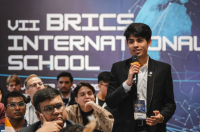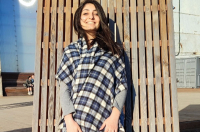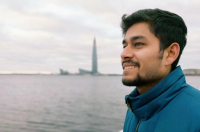Youssef never planned to come to Russia and certainly didn’t plan to study at ITMO University. He completed a Bachelor’s degree in civil engineering, a field not offered within ITMO’s unique profile. In 2009, when he completed his studies at Aleppo University in Syria, he was top of his class. The war in Syria hadn’t started yet and cultural exchange agreements abounded. Due to his excellent grades, he was offered a scholarship by the Syrian government to complete further education in his country of choice.
He chose France. His love for the French language, and his uncle’s own experience of studying in France led him down this path. Eighteen months of intensive French studies and a DELF (Diplôme d’Etudes en Langue Française) certificate later and he was nearly there. In June 2012, just before the Battle of Aleppo began, the French Embassy in Damascus closed and relations between Syria and many European countries began to deteriorate. He was told he could no longer travel.
“I was shocked and disappointed and I felt in that moment that all my dreams and plans for the future were shattered,” shared Youssef.

He was still given another chance: to choose from a small list of countries that had good relations with Syria. He could get a scholarship to go to China, Russia, India, Iran and a few other countries.
After two years of applying to different countries with limited spots available for Syrian citizens, he eventually got accepted in a Master’s degree program in Moscow, where he was first required to study the Russian language for one year. He arrived in Russia in the middle of December in 2014, right in the heart of winter. He was accepted to the Moscow State Automobile and Road Technical University where he finished his Master’s degree with Excellence.

It was then that he began searching for a PhD degree in GIS with a scholarship. He had four options. ITMO University was his last. He was concerned about applying to ITMO since there was no dissertation council at ITMO for his area of specialization to whom he could defend his thesis. But after he was unable to get into the other universities on his list, he was accepted to ITMO University.
“When I came here to ITMO, I had a great supervisor: he is a good man and he told me not to worry about the dissertation council because he will help me to defend my thesis at another university in St. Petersburg. And I realized that it was my destiny to be at ITMO and now I’m very happy to be a student at such a great university like ITMO,” says Youssef.
Youssef has just completed his first year as a PhD student at the Department of Geoinformation Systems. One of the things that he has observed about the difference between the education systems is that in Syria there are five large universities with almost all areas of study. Each speciality has a separate faculty and building. However, in Russia, there are many universities and institutes, each offering different areas of study.

The other major difference is that Syrian students are graded on a scale of 0-to-100, while in Russia they are graded out of 5. As a result, students who pass their exam are graded either as satisfactory, good or excellent. As Youssef explains “I believe that those three evaluations are not sufficient to evaluate all the levels of students. For example you can notice that in one class a lot of students have 5 (excellent), but they surely don’t have the same level of knowledge or mastering the studied course. But the system of 100 points can evaluate every student more precisely.”
“After finishing my studies, I’m going to return to Syria to teach, as per the conditions of my scholarship. My dream is to become a famous professor in my field, and I hope that this dream will come true.”



